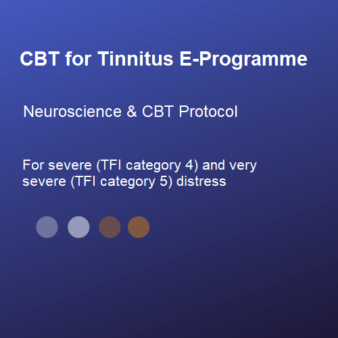Simon
Simon, UK
Mid-course review written at Stage 6 (of 12) 17 weeks after enrolment
Tinnitus Functional Index (TFI) 70.0% > 28.8% (category 4: big problem > category 2: small problem)
Q: Do you recommend others to use the CBT for Tinnitus E-Programme?
A: "Yes. My advice would be that the understanding of the brains capacity to alter, and the advice provided on generating a positive attitude are invaluable. I would advise though that some content does seem quite technical and not always easy to absorb."
Q: What benefit have you experienced using the relaxation element of the course so far?
A: "I have never tried relaxation techniques before so all the breathing/relaxation exercises are new to me. Without exception, these have been very helpful, not only in teaching me (my brain), to have a much calmer approach to tinnitus, even if the tinnitus remains. For example, if I suddenly find myself in a ‘tinnitus storm’, a pause in whatever I am doing and a few minutes breathing exercise will lower my anxiety levels and restore equilibrium to the day, even if the tinnitus does not disappear. There is a further point to make. The relaxation exercises have improved my life overall. I have a history of being a bit wound up, or tense, over worrying about things. Whilst this has never been to such a degree of making me ill, it has made me into a bit of a worrier. The relaxation exercises have without any doubt made me calmer, able to recognise when I am being unnecessarily worried about things. My attitude to life has improved."
Q: How has the neuroscience-based learning about the amygdala, autonomic ladder and brain plasticity helped you to relate to your experience of tinnitus, anxiety and stress?
A: "I understand the theory that has been described but I still want to go back to the early stages and re-read the parts concerning the amygdala, the hippocampus etc, as I am not sure all the component parts of the process of brain function are embedded in my brain. I do recognise the ability for the brain to change and the plasticity of the neural pathways. I understand how this can affect men experience of tinnitus."
Q: What have you learned from the Costs & Benefits Transaction work (used from Stage 3)? Estimate how much you have already adjusted from having a PROBLEM-ORIENTED perspective towards a RECOVERY-ORIENTED perspective (e.g. 2/10 > 7/10 indicates an improvement of 5 so far)
A: "Everything I think about tinnitus comes from a recovery orientated position. Whilst I have not been good at sending in a Costs & Benefits Transaction as often as I should, I absolutely understand the necessity of a positive mental attitude. The reading that you have provided reinforces this at every level."
Q: You are likely to have had your first 1-1 by now. Did you benefit from your 1-1 and if so, how?
A: "I did not know how the 1-1 was going to be structured, and to some extent thought it might be more of a therapy session than general conversation about my progress. I have a second session booked and will be more prepared with specific areas I wish to discuss. We had a pleasant discussion and touched on various topics concerning my progress, I felt relaxed and comfortable after the session.”
Q: What is your own impression of your progress to date?
A: "I am calm and relaxed about my tinnitus, the course has taught me that. My tinnitus has not gone away, I do not know even if it has altered at all, but I suppose my perception has altered. I think that without the course, I would not have been able to shift my mindset in such a positive way."

